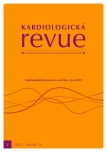-
Medical journals
- Career
Multiple administration of medication and circulatory failure for malignant ventricular arrhythmias and impairment of liver function
Authors: J. Vítovec; K. Židová
Authors‘ workplace: I. interní kardioangiologická klinika LF MU a FN u sv. Anny, Brno
Published in: Kardiol Rev Int Med 2012, 14(2): 126-128
Category: Case Report
Overview
Multiple administration of medication and circulatory failure for malignant ventricular arrhythmias and impairment of liver function. This article presents a case history of a polymorbid patient with serious arrhythmias in the ischemic substrate of the myocardium and circulatory failure. The patient was diagnosed with ventricular tachycardias, which led to repeated discharges of the implanted ICD. The patient was receiving multiple medicaments concurrently (17 medicaments), a number of which (doxycykline, amiodarone, atorvastatin) had hepatotoxic characteristics. The increase in liver enzymes can be explained through the simultaneous administration of amiodarone, doxycycline and statine. Nor can the effect of ischemia during circulatory failure in the case of long-term tachyarrhythmias be omitted. The normalisation of liver function occurs following the curbing of serious circulatory arrhythmias and the significant reduction of pharmacotherapies.
Keywords:
malignant arrhythmias – liver impairment – administration of multiple medicaments
Sources
1. Simon JB, Manley PN, Brien JF et al. Amiodarone hepatotoxicity simulating alcoholic liver disease. N Engl J Med 1984; 311 : 167–172.
2. Wilson JS, Podrid PJ. Side effects from amiodarone. Am Heart J 1991; 121 : 158–171.
3. Ambrosy AP, Vaduganathan M, Huffman MD et al. EVEREST trial investigators. Clinical course and predictive value of liver function tests in patients hospitalized for worsening heart failure with reduced ejection fraction: an analysis of the EVEREST trial. Eur J Heart Fail 2012; 14 : 302–311.
Labels
Paediatric cardiology Internal medicine Cardiac surgery Cardiology
Article was published inCardiology Review

2012 Issue 2-
All articles in this issue
- Antiaggregating and anticoagulant therapy – basic principles
- Oral antiplatelet therapy in patients with acute coronary syndrome
- Current guidelines for antiplatelet therapy in neurology
- Anticoagulant therapy and atrial fibrillation
- New peroral antithrombotics in the prevention and treatment of tromboembolism
- New antithrombotic drugs in the prophylaxis of postoperative venous thromboembolism
- Current possibilities of monitoring of antithrombotic therapy – new antithrombotic drugs
- Where is a step in the current development of drugs that affect blood clotting?
- Vorapaxar in clinical studies
- What is vernakalant and what is its place in clinical practice?
- Eprosartan – dual blocker of AT1 receptors
- Multiple administration of medication and circulatory failure for malignant ventricular arrhythmias and impairment of liver function
- Heart Transplant Patient with Invasive Pulmonary Aspergillosis
- Cardiology Review
- Journal archive
- Current issue
- Online only
- About the journal
Most read in this issue- Antiaggregating and anticoagulant therapy – basic principles
- Anticoagulant therapy and atrial fibrillation
- Where is a step in the current development of drugs that affect blood clotting?
- Current guidelines for antiplatelet therapy in neurology
Login#ADS_BOTTOM_SCRIPTS#Forgotten passwordEnter the email address that you registered with. We will send you instructions on how to set a new password.
- Career

